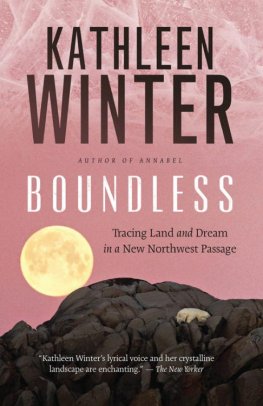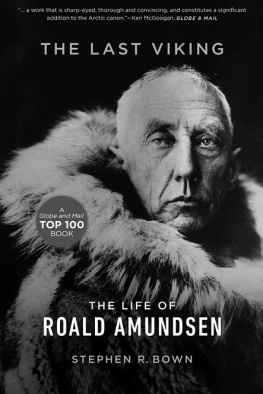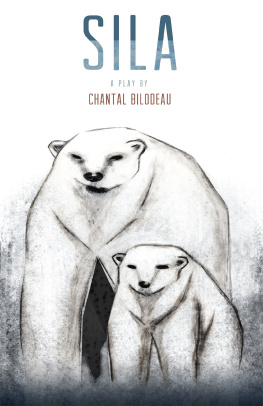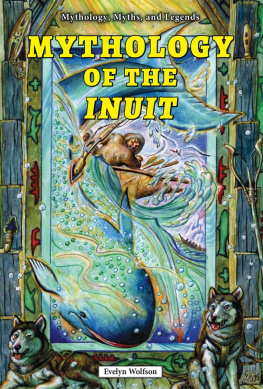Kathleen Winter
BOUNDLESS
TRACING LAND AND DREAM IN A NEW NORTHWEST PASSAGE
Water, land, wind, sky these are the only ones with absolute freedom.
BERNADETTE DEAN
The body is a feather blown across the tundra.
AAJU PETER


A WEEK BEFORE I got the invitation that would revive an old, lost search of mine, I lay on a dock with college friends. This was our second summer reunion after thirty years of going on with our separate lives, and wed all grown up. Id turned fifty and could finally laugh with a kind of compassion at the heartbreakingly young faces of our yearbook photos. Wed forgiven petty old hurts and now saw each other with more far-sighted, more human eyes. I wasnt used to the laughter was used to long hours squirrelled away in a room, alone, writing, then my family coming home for supper; once in a while, a foray out to the library or to have coffee with one friend at a time, or a short pilgrimage alone. This was a dock party. I felt like a character in a Judy Blume book. We had cold beer and nachos, and the cottage was a scrap of heaven that Aloise, my old university roommate, had built with her husband.
Lying on that dock I remembered how many questions Id had about life back when Aloise and I lived together as students, in a tenement above a tavern that pulsed coloured light into my bedroom. In those days I sensed, at times, a transformation of the ordinary world, catching a glimpse of something beautiful and strange. The glimpse transformed stones, apples, streets, and trees into something other than a storyless chaos: I saw the city bathed in a kind of inaudible music, or swirling transparence, with mysterious significance. In those moments, there was no such thing as ordinary. When the glimpse vanished, as it always did, I was bereft. I felt the world had been trying to speak. The whole of existence felt charged with a luminous significance about which I yearned to know more.
Throughout my youth these transcendent events plunged me, for a few minutes at a time, into a blaze of connectedness and belonging. It was as if I were a lost piece of energy as if sometimes, for an instant of bliss, I accidentally got connected to the electrical circuit to which Id belonged all along. But then the disconnection recurred, and the familiar sadness. The vision I glimpsed in those blazing moments was powerful and alive, but it was, too, mysteriously imperilled. Something told me that this life, with its simple, dear things cranes against the skyline, dawn light on gulls wings, and the loveliness of light and shadow on city staircases this life was more than it seemed, and it was endangered in a way I did not yet understand. I asked others if they felt this, I studied my college texts to see if they could explain, and I searched spiritual paths as well; but the only real source was the natural world itself, its tangible objects, its light, and its forms.
I did find company in poets, who seemed to me to be the only people who understood. William Wordsworth wrote that in his youth, the earth and every common sight appeared to him clothed in light, with the glory and freshness of a dream. But having grown older, he lamented, Nothing can bring back the hour / Of splendour in the grass, of glory in the flower I knew what he meant. After I left university my own perception dwindled to make room for the details of what my daughters would call my homesteading phase. I wandered into marriage with a man who hoped I was someone I could never be. He fell ill and after two years he died, and sometimes I thought hed died of disappointment in me. We had a little girl and after her father died she helped me stack wood and clean the chimney, standing under it with a bucket into which I, with a steel brush on the roof, swept the soot.
Then I met my second husband, a bricklayer, stone worker, and chimney expert, and things began to look up. We had a second daughter and got caught up in the work of raising a family. In that world, though there were beautiful times, that old, mysterious vision, or lost world, retreated behind soup pots and mortgage payments and feeding our goats. I quietly despaired of finding any key to the world Id glimpsed just underneath or somehow within this ever-so-uninspired one.
But now that phase had neared its end. Wed moved to Montreal and Id left my chimney brush behind. My daughters were becoming more independent and I could come here, to Aloises lake, with the old friends whod surrounded me in my youth, when everything was all about possibility. Lying in the sun as waves lapped the dock, I became my younger and older selves at the same time.
Every now and then one of us would blurt something wed learned over the years, and it was Denise who said, One thing Ive learned is, always be ready to accept an invitation if it means you get to travel somewhere. If anyone says to me, Denise, wanna go skiing in the Rockies? or if they say, Hey, four of us were gonna go see Scarlett Johansson on Broadway but Hadley cant make it now, do you know what I say?
No, Denise, I said. What do you say?
My. Bags. Are. Already. Packed.
Wow.
And I mean it. I have a packed bag in my closet thats always ready to go. It has a pared-down version of my toiletries, underwear, a couple of changes of clothes. I dont even need to look in it.
I loved this idea. I wasnt sure if it was because I was lying, sun-warmed, on the silvery boards of Aloises dock in July little slaps of the wavelets lulling me, then a loon call, and puffy white clouds sailing by but I felt a thrill.
Ill do it too, I said. Im gonna pack my getaway bag as soon as I get home.
Dont just talk about it, Denise said, sucking on her beer with that same mischief shed had thirty years before. Denise was an instigator. She was the one who dared you to spill your secrets, but she never spilled any of her own. She was a wicked woman and I felt some of her subversiveness rub off on me as I imagined packing my getaway case and stashing it in my bedroom closet.
Dont clutter it up with too much stuff, she warned. The bare necessities. Thats the key. Dont pack a lot of clothes.
And I didnt. As soon as I got home I packed a bag and boasted about my readiness for adventure. My husband, Jean, and my youngest daughter Juliette kept quiet, as they have done through many of my personal announcements, because they know if they question me I wont be fit to live with. They are used to seeing me go through life intuitively, with inexplicable turns of events. They know its torture for me, for example, to force myself to follow a recipe or to have to explain my plans for the day. I might throw figs in the stew, slide down the subway banister, or change my mind on the way to the public library and end up in a paddleboat on the canal. Why read The Wind in the Willows when you can be Ratty or Mole?
The new getaway suitcase was just another example of my need for the unexpected. But even I was surprised when the call that would activate the bag came within days. It was seven in the morning on a Saturday a strange time for my phone to ring.
Would you be at all interested, a writer colleague said, in going on a vessel through the Northwest Passage?
The Northwest Passage?
Yes, said my friend Noah. You might have heard that Russian icebreakers sometimes go up there and take passengers through. They like to have a writer on board, and I cant go, so I suggested you, but I wanted to check with you first that it might be something youd like to do.









